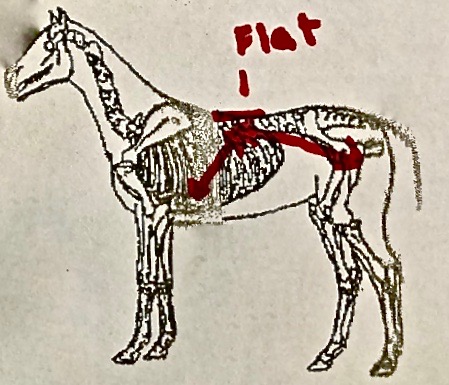Holistic Horsekeeping
How to have a healthy happy horse.
Volume 26, Number 12
=*=*=*=*=*=*=*=*=*=*=*=*=*=*=*=*
In This Issue:
1. Helping Your Stressed Horse with Adrenal Gland Health
2. Develop a Better Relationship with Your Horse
=*=*=*=*=*=*=*=*=*=*=*=*=*=*=*=
Properly functioning adrenal glands are essential for survival. These glands are located just in front of the kidneys of the horse. The outer layer(cortex) of the adrenal gland is involved in a variety of body functions, including maintenance of fluid and electrolyte balance, immunity, defense, and energy metabolism. The cortex produces corticosteroids in response to adrenocorticotropic hormone that is released by the brain during stress.
The inner layer (medulla) of the adrenal gland secretes epinephrine and norepinephrine in response to sympathetic stimulation. The innervation for the adrenal gland comes off the spine at the level of TH 15, 16, 17. This is the mid back region just in front of the lumbo-thoracic junction. This area of the spine also is the nerve origination for the duodenum (upper small intestine), the kidneys and diaphragm. The psoas muscle attaches under the spine in this area as well. The psoas inserts into the diaphragm in the forward branch and the inner part of the hip in the lower half.
Can you see the disaster of all these connections for the horse that stays in a constant sympathetic (fight or flight) state?
First, the adrenal glands will get stressed which will create tightness in the tissues around them. This will manifest and tension in the mid back. Because it is tension, and not an injury, you may not see pain on palpation in the area. What you will see, if you look closely, is a flattening of the spine at TH 15, 16, 17 and possibly adjacent spinal segments. This tension will greatly hinder the horse’s ability to lift the back and the ribs in the area will also be less mobile. If allowed to continue, you can see kissing spines develop.

Second, because of the connection to the psoas muscle, you can see the horse have difficulty taking and deep breath because of tension on the diaphragm and/or hip tightness.
Third, with feedback from the stressed adrenal glands to the shared spinal segments you can also see poor function in the upper small intestine or decreased blood flow leading to duodenal ulcers.
Fear, pain, overwork, and uncertainty are all causes of adrenal stress. It is difficult to keep you horse completely free from stress and that is not needed. The best way to prevent this train wreck is to keep the nervous system of the horse balanced so he can easily move up and down the scale of sympathetic or parasympathetic states as needed. Things that help your horse have healthy adrenal glands include reward-based training systems that minimize fear, body work and appropriate treatments to relieve pain, regular breaks from training and showing and as stable an environment as possible.
Some horses will still be more prone to stress, and these can be supported with extra nutrition for the adrenal gland and calming herbs. For adrenal nutrition you can add extra magnesium into the diet. Extra vitamin C can be helpful during stress. I like Citrus C/Q. Kelp and blue green algae are natural sources of magnesium, but these alone may not be enough for some horses.
I use Focus mushroom formula or SweetmarePlus for mares that show stress with irregular or painful heat cycles. For horses that seem to be always on alert and nervous I use Calm hemp at the rate of 1/4 to 1/2 cc twice a day. For horses that I suspect have weak adrenal glands or have already moved into adrenal burnout I use PhytoAdrenal at the rate of 1 cc a day in addition to the Calm hemp.
Preventing adrenal stress is always best but not always possible. Supporting health of the adrenal glands can help your horse avoid chronic emotional and physical issues.
2. Develop a Better Relationship with Your Horse

By learning about your horse’s temperament type, you can develop a better relationship with and understanding of your horse. We have lots of resources to help you discover what type your horse is and what the special needs of that type are. You will find lots of information on the Horse Temperament website, including an online course, help from temperament consultants, balancing formulas, and books/audios. Then check out the “5 Element Personality” sections of articles on our blog and the Intro to 5 horse types and temperaments on Holistic Horsekeeping.
++++ Copyright | Getting On and Off the List ++++
Unless otherwise attributed, all material is written and edited by Madalyn Ward, DVM. Copyright (c) 2021 HolisticHorsekeeping.com and Madalyn Ward, DVM. All rights reserved.
If you like the material in this newsletter please let your friends know about it. You may reprint material in other electronic or print publications provided the above copyright notice and a link to http://www.holistichorsekeeping.com is included in the credits.
When you forward this material, please send the entire newsletter. Thanks!
Please also enjoy all of Dr. Ward’s web resources:
http://www.holistichorsekeeping.com
http://www.horsetemperament.com
http://blog.horseharmony.com
https://www.facebook.com/HolisticHorsekeeping
https://www.facebook.com/HorseHarmony
Twitter: madalynward